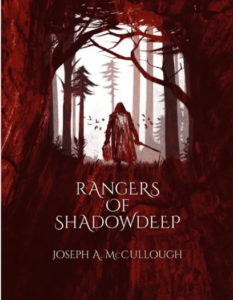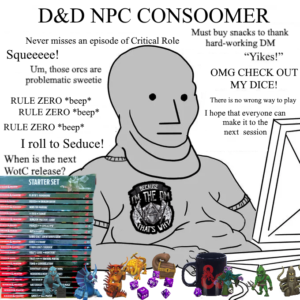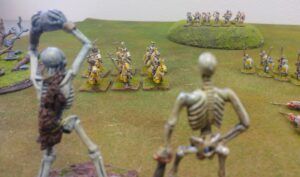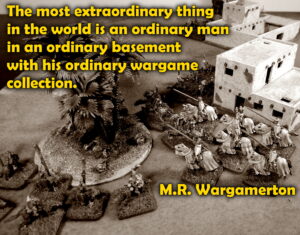Second Thoughts on “Rangers of Shadowdeep”
 Yesterday I wrote a glowing review of the game Rangers of Shadowdeep, by Joseph A. McCullough, capped by a lengthy complaint about a background that trades on the foundational rock of Western Civilization without naming Him. As is so often the case these days, everybody wants the fruits of obeying the Ten Commandments without acknowledging their author.
Yesterday I wrote a glowing review of the game Rangers of Shadowdeep, by Joseph A. McCullough, capped by a lengthy complaint about a background that trades on the foundational rock of Western Civilization without naming Him. As is so often the case these days, everybody wants the fruits of obeying the Ten Commandments without acknowledging their author.
Perhaps that comes later – I’m only two scenarios into the on-going Shadowdeep campaign after all – and yet it is still worth delving into my approach to heroic fantasy wargames in a more general sense.
[A disclaimer: What follows has more to do with cultural trends and the conventional wisdom of modern man than it does with Joe McCullough. I’ve never met or spoken with the man, and nothing that follows should be taken as a slur or accusation against him. His game is just the latest example of a wider trend to cross my horizon. It inspires the following only by timing, and not by egregiousness. I highly recommend his game to anyone who cares to listen. So much so, here’s another link to purchase the latest edition.]
In their attempts to excise Christ from all facets of our lives, Western Modernists have taken a conception of fantasy hews much closer to JRR Tolkien than to C.S. Lewis. They eschew any mention of Christ, or bury Him under mountains of camouflage. And yet, despite their best efforts, they remain children of the West and they remain shackled by the philosophy that undergirds Western Civilization. They can run from Him as fast as they want, but they can’t escape the firmament that undergirds their culture. Not fully, and not without sacrificing all of the creature comforts that follow from living a life and building a society in line with the Natural Laws of God’s green earth.
They take for granted the entire concept of heroism on which modern fantasy trades. They seek to replace our mission – to care for this world and its inhabitants both animal and human not for their own glory but for His – with the penny-counting mathematics of pragmatic maximization of mere creature comforts.
 This explains why so much of modern fantasy feels so soul-less. And what a perfect word for modern fantasy – it literally lacks any sense of the soul. All the wonder and majesty of fighting the implacable forces of Hell in pursuit of the eternal reward of a place in the Heavenly Hosts demolished and replaced with the hopes of a day safe from harm, for a night in a warm bed, for another glass of fine wine, or one more orgasm.
This explains why so much of modern fantasy feels so soul-less. And what a perfect word for modern fantasy – it literally lacks any sense of the soul. All the wonder and majesty of fighting the implacable forces of Hell in pursuit of the eternal reward of a place in the Heavenly Hosts demolished and replaced with the hopes of a day safe from harm, for a night in a warm bed, for another glass of fine wine, or one more orgasm.
It’s tawdry. It’s small minded. And it shows.
Embracing that utter lack of a higher purpose is often couched in near-altruistic terms; the hero fights not for his comfort, but for that of those back home, you see. It’s a neat little shell game that shifts the root motivation of the hero’s actions from desire for his own comfort to the comfort of others. Most people don’t notice that the shell game changes nothing fundamental about modern fantasy, but they can feel it. People can sense the emptiness of shows like “Rangs of Powah!” and “Not The Witcher” and whatever show Netflix has planned next, and the audience is tuning out in droves.
For tabletop gaming, though?
Forget it. When my little lead hero wades into battle, he does so explicitly as my avatar. I am living vicariously through him, having the same adventures as he does, overcoming the same challenges he does, and motivated by the same desires as he is. When he fails, I feel the disappointment. When he succeeds, I feel the thrill. When he learns from my mistakes, I learn from his. What he does, I do – particularly in a game centered on one big dang hero like Rangers of Shadowdeep.
So when I play, I play for higher stakes.
It’s not just the creature comforts of off-table women and children and weak kings, it’s to bring glory to Him who deserves it most. Sure, I may file the serial numbers off once in a while, but even then He remains. My little lead hero’s efforts to push back the chaos on the tabletop echoes my own efforts to push back the chaos in the real world. He inspires me to try harder, to push back more, and to be smarter about which battles to fight and how. While the figure itself may not have a soul, my games at least acknowledge such things exist, and that have a far greater meaning than a few copper pieces and another night of ease.
And if you want your games to have that kind of depth, you have to put the soul back into them.
And that means putting the One who breathed your soul into you, back into your games, as well.
